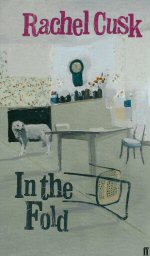 Finished Rachel Cusk's Booker-longlisted In the Fold a few days back. It was a pretty curious read and I'm still working out whether I actually enjoyed it or not ...
Finished Rachel Cusk's Booker-longlisted In the Fold a few days back. It was a pretty curious read and I'm still working out whether I actually enjoyed it or not ...Here's the plot which, having tried to distill it down for you, seems both convoluted ... and not terribly fascinating (you can skip the next bit if you want) :
When Michael is invited by his friend and fellow student to attend his sister's 18th birthday party, he quickly falls in love with the eccentric and bohemian Hanbury family of Egypt Hill, a wonderful old house and large sheepfarm in Devon.
We're never told much about Michael's background, but can only surmise that it must have been pretty dull for him to have been so easily seduced by this apparently chaotic and Bohemian extended family.
We then skip a decade or two. Michael is an established lawyer and has married into a family which shares many similarities with the Hanbury's: the Alexanders are wealthy, aristocratic and unconventional. But his relationship with his wife Rebecca is uneasy: she seems to be going through a crisis after the birth of their son, Hamish. When the balcony of their Georgian townhouse in Bath falls and almost kills him, it is clearly symbolic of the state of their marriage.
Then Adam gets in touch. His father is in hospital having a prostate operation. It's the lambing season and Adam could use another pair of hands. Michael decides to use the opportunity to take a break from his marriage, and carts the non-communicative Hamish along with him.
Egypt is little changed, although ugly modern development encroaches on the hill and has swallowed up much of the town. The Hanburys don't improve with reaquaintance: Michael witnesses the family bickerings and machinations, and in a climactic scene in the farm's kitchen, the disclosure of ugly secrets buried for decades.
Phew!
So if plot isn't the point of the novel, what is? Cusk's great strength here is in careful social observation and fine detailing, and In the Fold is an extremely interesting comedy of manners. Michael is a strangely inert central character which makes him the perfect observer of the drama unfolding at Egypt ... and also in his own home. The characters are very well drawn and most quite stunning in their awfulness.
There's a lot of dialogue - in fact in many of the scenes nothing happens but talk, so that it felt, at times like reading a playscript. But the conversations are so totally revealing of the characters, brilliantly observed and often very funny.
But maybe I wasn't concentrating hard enough because I kept getting confused about who was who in the Hanbury clan (there's a large cast of minor characters) and had to flip back the pages. Annoying!
Cusk's writing is delightfully witty and I was much amused by her descriptions. Here she's describing Michael's son:
Hamish was a big, peculiar baby with flowing blonde hair and the prominent features of a general or a politician. He seemed to relish pointing out the obvious, and treated everything as a joke: in this way he was identifiably male, though in spite of his size and virile countenace there was something effeminate about him. He was like a big, exuberant, bad mannered amphibian, or a laughing androgenous cleric. The spectacle of Rebecca looking after him suggested that of a teenaged girl entertaining her first, unruly boyfriend in the family home.Honestly, I love writing like this.
Hmmm. I think on balance that I did enjoy the book.
Would I recommend it? For sure, if you enjoy literary fiction of the Bookerish kind. Not otherwise.
Postscript
I found Cusk's discussion of the novel at the Guardian website, fascinating. Best line:
I don't really believe in stories, only in the people who tell them.
5 comments:
Hi Sharon, yes, defintely you should recommend it. I actually read it some time back. I scanned it into an ebook, and took my time reading it on my PDA. Yes, at first, like you, I couldn't be sure if I had enjoyed it, because there was virtually no plot, just pages (in a PDA it's even more and more pages!!!)of dialogue. But in the end I still like it, and I'm reading Cusk's other previous books.
Sorry, my connection broke just when I was about to add on this:
BTW, I saw Marina Lewycka in an Euro culture TV program recently: she was staying - and working on her next novel - in some writers' retreat, some villa in Italy.
thanks leon - glad you had similar feelings. i would like to read her other stuff now ...
glag marina lewycka is writing her next novel - will really look forward to that
"He seemed to relish pointing out the obvious, and treated everything as a joke: in this way he was identifiably male."
Er.. touche ? :)
anonymous - which is why i laughed!
Post a Comment